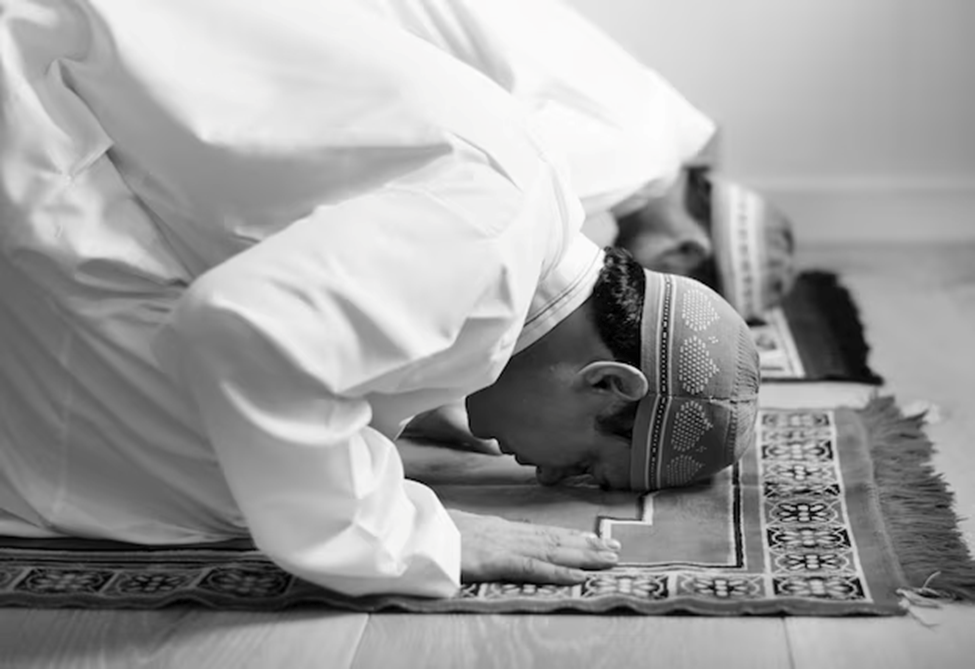Whether you live in Dubai or you’re just visiting, knowing the prayer time in Dubai is crucial to experiencing the city’s diverse culture and religious heritage.
In this detailed blog post, we’ll offer simple explanations about the five daily prayer times practised in Dubai according to Islamic customs. Prayer time holds significance in Dubai, and we’re here to guide you through everything you need to grasp. Ready to begin?
Understanding Prayer Time in Dubai

Prayer time in Dubai is calculated using a combination of astronomical calculations and Islamic jurisprudence.
- Astronomical calculations are used to determine the time of sunrise, sunset and the position of the sun in the sky. These calculations are based on the latitude and longitude of Dubai, as well as the time of year.
- Islamic jurisprudence is used to determine the time of the five daily prayers. The Hanafi madhhab, is the most widely followed madhhab in Dubai, and I used it in the criteria to calculate prayer time.
It is important to note that there is some variation in the prayer time calculated using astronomical calculations and Islamic jurisprudence. This is because astronomical calculations are based on the position of the sun in the sky, while Islamic jurisprudence is based on the position of the shadow of an object. As a result, the prayer time calculated using astronomical calculations may be slightly different from the prayer time calculated using Islamic jurisprudence.
Five Daily Prayers and their Timings

- Fajr (Dawn)- The Fajr prayer is the day’s first prayer before sunrise. The time for Fajr prayer begins at the beginning of the dawn (5:04 a.m.) and ends when the sun rises (6:19 a.m.). The Fajr prayer is two rakats (units) long.
- Dhuhr (Noon) – The Zuhr prayer is the second prayer of the day and is prayed at midday (12:06 p.m.). The time for Zuhr prayer begins when the sun passes its zenith and ends when the shadow of an object is twice its length. The Zuhr prayer is four rakats long.
- Asr (Afternoon)- The Asr prayer is the third prayer of the day and is prayed in the afternoon (3:19 p.m.). The time for Asr prayer begins when the shadow of an object is twice its length and ends when the sun begins to set. The Asr prayer is four rakats long.
- Maghrib (Sunset)- The Maghrib prayer is the fourth prayer of the day and is prayed at sunset (5:47 p.m.). The time for Maghrib prayer begins when the sun disappears below the horizon and ends when the twilight has completely disappeared. The Maghrib prayer is three rakats long.
- Isha (Night)- The Isha prayer is the fifth and final prayer of the day and is prayed at night (7:01 p.m.). The time for Isha prayer begins when the twilight has completely disappeared and ends before dawn. The Isha prayer is four rakats long, but there is an additional two rakats that are optional.
Factors Affecting Prayer Time
Geographic location
Prayer time changes based on where you are. This happens because the sun’s position in the sky isn’t the same everywhere due to different latitudes and longitudes. For instance, prayer time in Dubai won’t match those in London, even if they share the same time zone.
Seasonal changes
Prayer time changes based on the season, too. This happens because the sun’s position shifts during the year. In summer, prayer time moves earlier, and in winter, they move later in the day.
Daylight Saving Time
Daylight Saving Time (DST) can impact prayer time too. This is because DST shifts when the sun rises and sets. In places that follow DST, prayer time shifts one hour earlier in summer and one hour later in winter.
Here are some additional factors that can affect prayer time:
- Weather: Weather matters too. If there’s thick fog or clouds, prayer time might get pushed back.
- Mountains: Prayer time can change if you’re near mountains. They can block the sun, making it hard to figure out when exactly sunrise and sunset are.
- Interpretation: Different Islamic scholars see prayer time a bit differently. This can cause communities to follow slightly different schedules.
Finding Accurate Prayer Time in Dubai

Official Sources for Prayer Time
There are a few official sources for prayer time in Dubai. These sources are considered to be the most accurate and reliable sources for prayer time in Dubai.
- Dubai Islamic Affairs & Charitable Activities Department (IACAD): The IACAD is the government agency responsible for Islamic affairs in Dubai. The IACAD publishes prayer time for all mosques in Dubai on its website. The prayer times are calculated using a combination of astronomical calculations and Islamic jurisprudence.
- Local Mosques: Local mosques are also a good source of prayer time. Most mosques in Dubai have prayer time posted on their websites or in their mosques. The prayer time are usually calculated using the same method as the IACAD.
- Mobile Apps and Websites: You can find various mobile apps and websites that offer prayer time for Dubai. These resources are usually updated more often compared to the prayer time released by IACAD or local mosques. You can check Gulf New’s UAE prayer time guid, or download AZAN UAE and UAE Praying Timing apps. Still, make sure to verify the accuracy of the prayer time from these apps and websites before you trust them completely.
Tips for Finding Accurate Prayer Time

Here are some tips for finding accurate prayer time in Dubai:
- Use an official source. As mentioned above, the most accurate prayer times are those published by official sources, such as the IACAD or local mosques.
- Check the source regularly. Prayer times are constantly being updated, so it is important to check the source regularly to make sure you are using the most up-to-date information.
- Be aware of the factors that can affect prayer time. As mentioned earlier, there are a number of factors that can affect prayer time, such as geographic location, seasonal changes, and Daylight Saving Time. Be aware of these factors when checking prayer time and adjust your schedule accordingly.
- Compare different sources. If you are unsure of the accuracy of a particular source, you can always compare it to other sources. This will help you to ensure that you are getting the most accurate prayer time possible.
Conclusion
In summary, knowing when to pray in Dubai is crucial for those who practice Islam. Being aware of the five daily prayers and when they occur allows people to organize their day and feel closer to their spiritual beliefs.
Thanks to today’s technology, finding the right prayer time is simpler than before. Reliable apps, websites, and mosque announcements are available to help you stay on track with your prayers. Remember, keeping these prayer times in mind not only adds a schedule to your day but also strengthens your connection to what you believe in.


